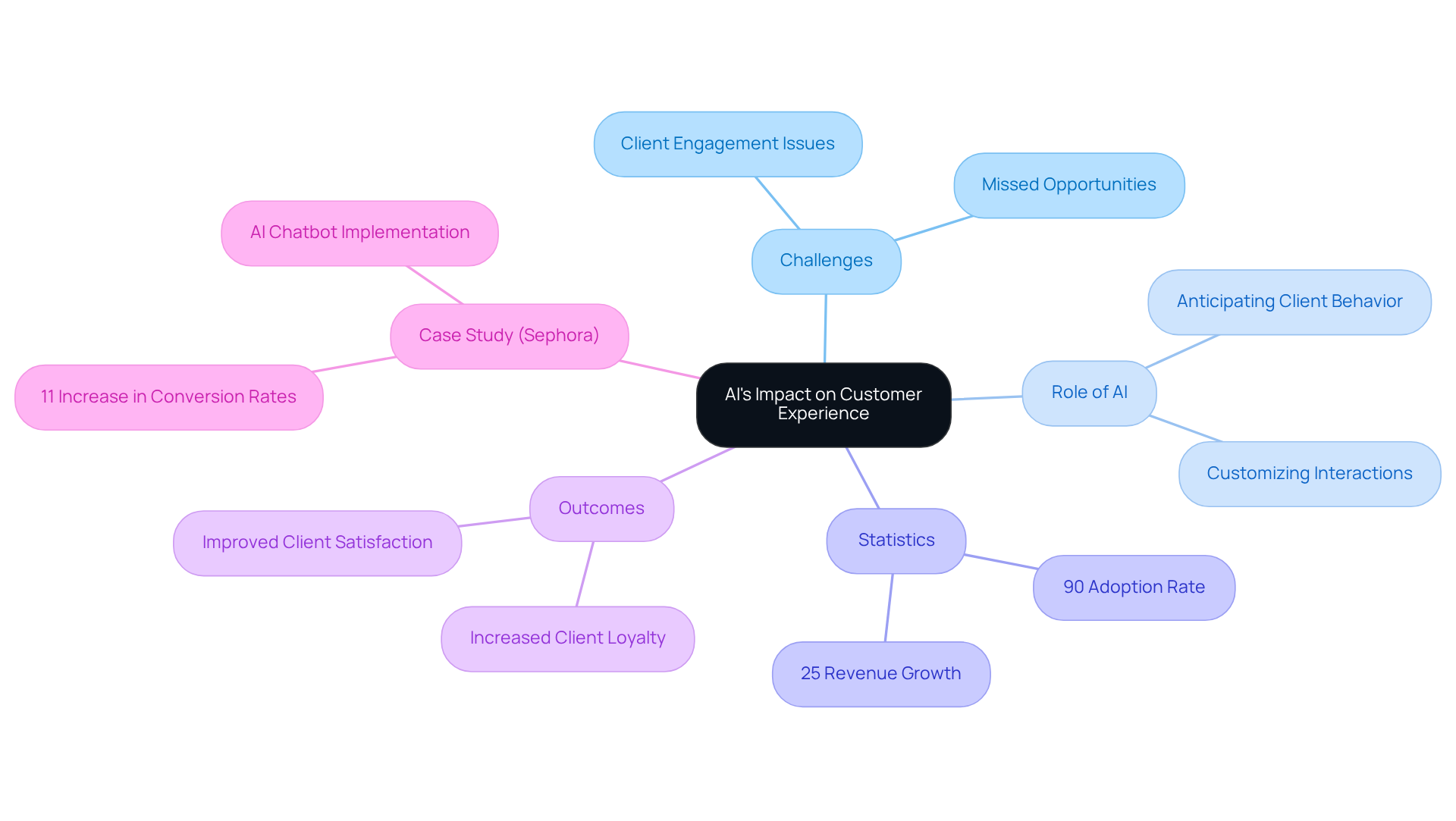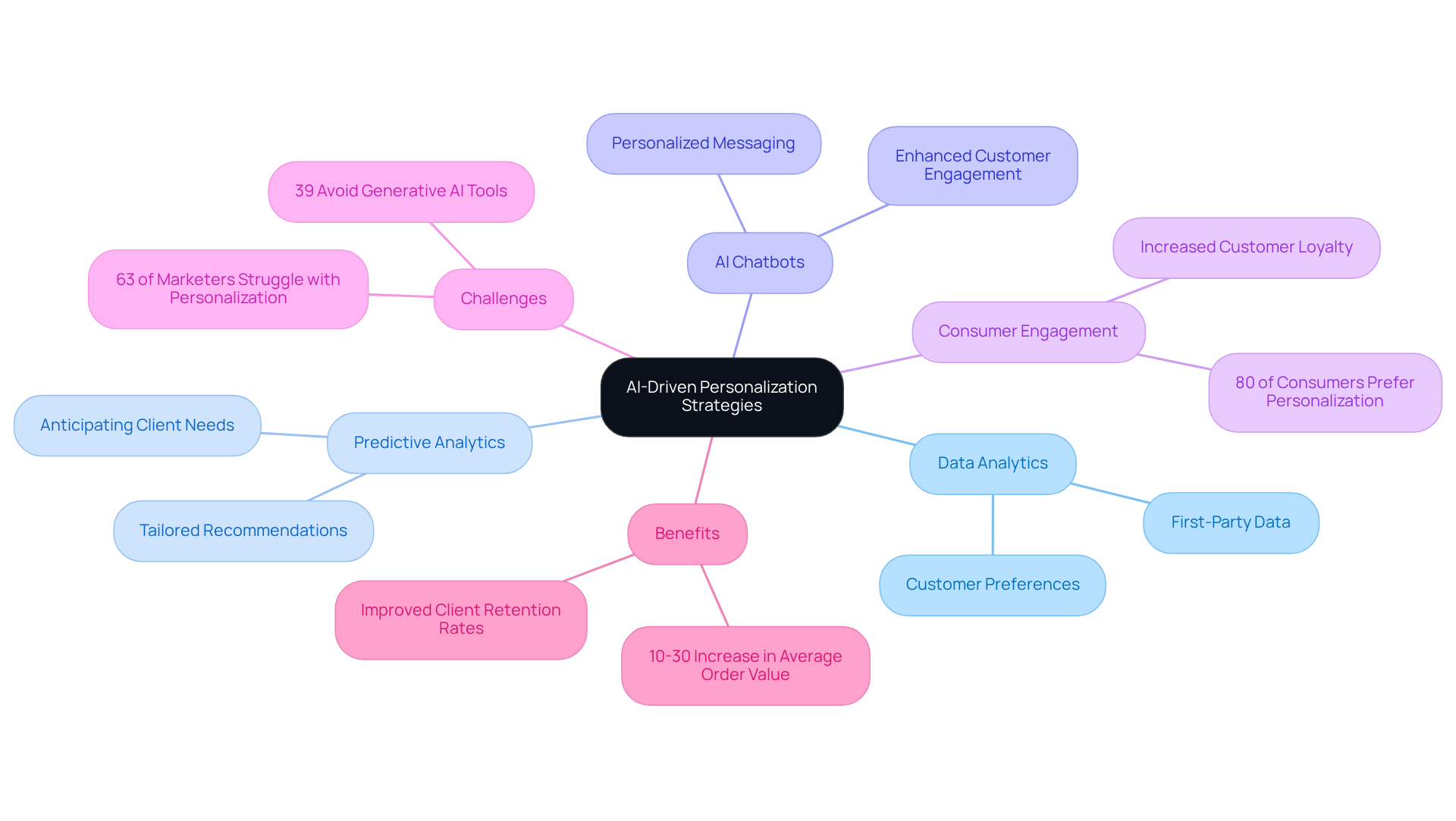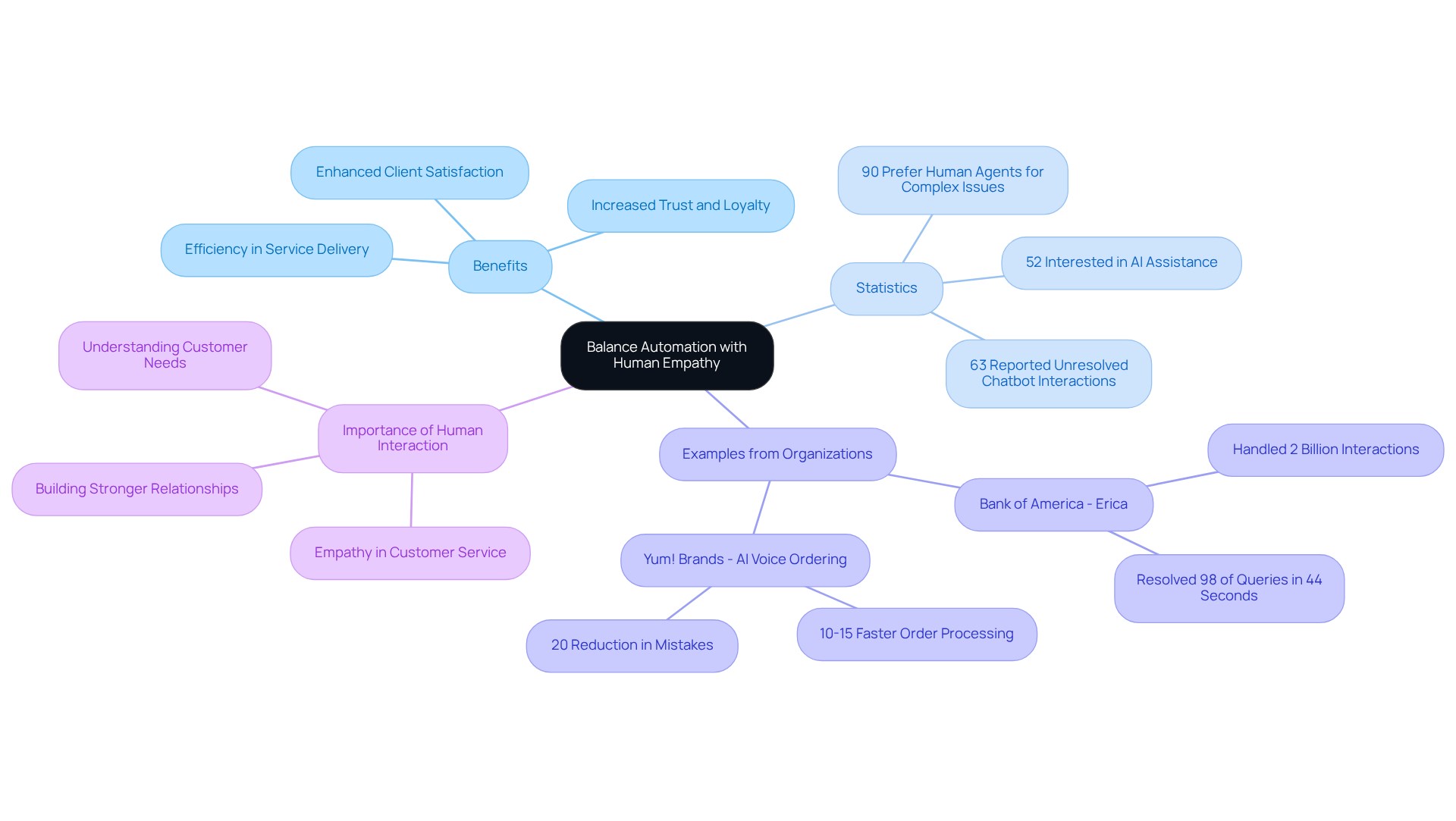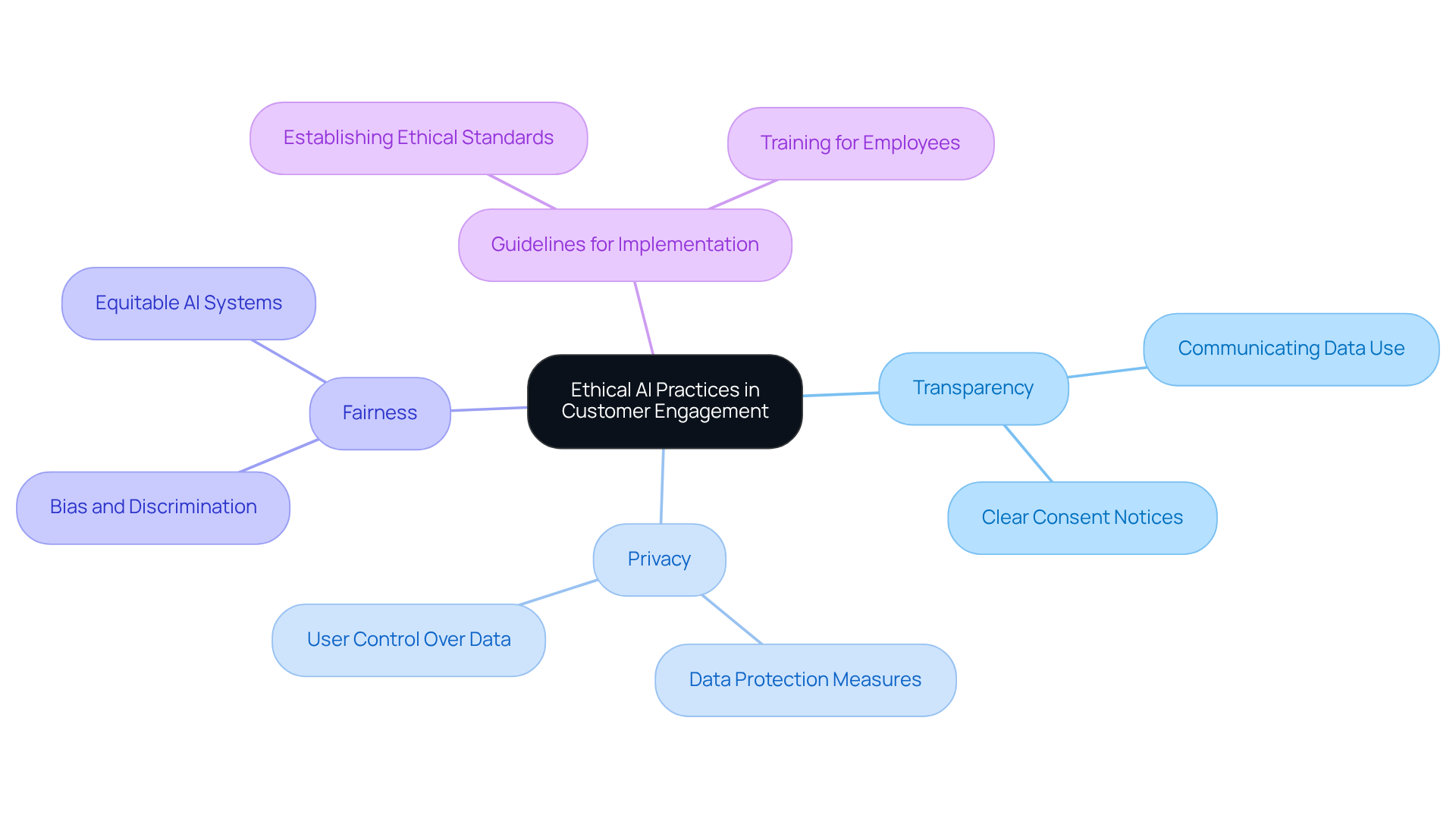Overview
In today's competitive landscape, businesses often grapple with the challenge of maximizing customer experience. This struggle can leave many feeling overwhelmed, as they seek ways to engage effectively with their customers. The implications of not addressing this issue are significant; businesses risk losing customer loyalty and satisfaction.
However, there is hope. By embracing artificial intelligence (AI) strategies, companies can truly transform their customer interactions. Leveraging AI allows for personalized experiences, streamlining operations, and ultimately enhancing customer satisfaction. Statistics reveal that 90% of companies are turning to AI for this very reason, and inspiring success stories, such as Sephora's AI-driven chatbot, showcase how such innovations can lead to increased conversion rates.
This journey towards improved customer experience is not just about technology; it's about nurturing relationships and fostering a community where customers feel valued and understood.
Introduction
The integration of artificial intelligence into customer experience strategies presents a profound challenge for businesses striving to connect with their clients on a deeper level. Many companies are eager to enhance engagement and foster loyalty, yet they often grapple with the pressing question: how can they effectively balance the efficiency of automation with the warmth of a human touch? This dilemma is further complicated by the need to uphold ethical practices in AI applications.
As we explore the transformative impact of AI on customer experience, we will uncover strategies that not only aim to meet but truly exceed customer expectations, nurturing lasting relationships in an increasingly competitive landscape. Together, we can navigate this journey, ensuring that technology serves to enhance, rather than overshadow, the human connection that lies at the heart of exceptional service.
Understand AI's Impact on Customer Experience
In today's fast-paced world, many companies face the challenge of effectively engaging with their clients. This struggle often leads to missed opportunities and a disconnect between businesses and the individuals they serve. Fortunately, is here to help bridge that gap. By examining vast information sets, companies can leverage artificial intelligence for customer experience to anticipate client behavior and customize interactions to meet personal preferences. For instance, can streamline routine tasks like data entry and lead scoring, freeing sales teams to focus on what truly matters—.
Recent studies reveal that a significant , with 77% either using or exploring the use of AI. This underscores a growing trend in the for customer experience that can no longer be ignored. Businesses that effectively utilize artificial intelligence for customer experience often report and loyalty. Notably, those that prioritize artificial intelligence for customer experience can achieve remarkable outcomes, including up to 25% revenue growth. Companies investing in have consistently demonstrated this level of success.
Take, for example, Sephora's implementation of an AI-driven chatbot and recommendation system as a form of artificial intelligence for customer experience that provides tailored product suggestions. This initiative has led to an impressive 11% rise in conversion rates, showcasing how AI can significantly enhance client interaction. By embracing artificial intelligence for customer experience, companies can not only meet but also exceed the evolving expectations of their clients, positioning themselves for sustained success in a competitive landscape. As we navigate this journey together, it's essential to remember that the heart of technology lies in its ability to connect us, and with AI, the possibilities for meaningful engagement are truly limitless.

Implement AI-Driven Personalization Strategies
In today’s rapidly evolving digital landscape, many businesses face the challenge of effectively personalizing client experiences using . This struggle can often lead to feelings of frustration and overwhelm, as the need for deeper connections with customers becomes increasingly apparent. Without the right tools and strategies, it can feel daunting to understand client preferences and behaviors fully.
Data analytics, along with artificial intelligence for customer experience, offers a ray of hope by providing valuable insights that can help businesses anticipate client needs. Predictive analytics, in particular, plays a crucial role in this journey, enabling tailored recommendations and communications that resonate with individual clients. For example, eCommerce platforms can harness the power of artificial intelligence for customer experience to suggest products based on previous purchases and browsing history, significantly enhancing the shopping experience and making clients feel valued.
Moreover, AI chatbots can deliver personalized messages that foster deeper engagement and connection. Implementing these strategies can lead to a remarkable increase in average order value—by 10-30%—and improved client retention rates, showcasing the transformative potential of artificial intelligence for customer experience in contemporary marketing.
It’s important to recognize that 80% of consumers are more likely to make a purchase from brands offering . This underscores the vital role of personalization in driving sales and nurturing lasting relationships with clients. However, many digital marketing executives—63%—struggle to provide these personalized experiences through artificial intelligence for customer experience. Additionally, 39% of marketers hesitate to utilize generative AI tools due to safety concerns, revealing the challenges that businesses must navigate.
Despite these hurdles, there is a path forward. By embracing and leveraging artificial intelligence for customer experience, businesses can create meaningful connections with their clients. This journey may be complex, but with the right support and resources, it is entirely achievable. Together, we can navigate this evolving landscape and unlock the full potential of .

Balance Automation with Human Empathy
While excels at managing routine inquiries and delivering rapid responses, it's essential to integrate into interactions with clients. Many organizations, such as Bank of America, have effectively prepared their service teams to recognize when to escalate issues to human agents. This ensures that complex or sensitive matters receive the attention they deserve. By utilizing [artificial intelligence for customer experience](https://desk365.io/blog/ai-customer-service-statistics), agents can be supported with , enabling them to tailor their responses effectively.
This combination of automation and empathy not only enhances client satisfaction—after all, —but also fosters trust and loyalty. Furthermore, 52% of consumers express interest in AI that assists them through product interactions, highlighting the potential for AI to enhance service without replacing the human touch. As organizations navigate the evolving landscape of service, finding the right is vital for enriching the client experience through artificial intelligence for customer experience.
However, it's crucial for companies to be mindful of over-relying on AI. A significant . This statistic underscores the importance of preserving a human aspect in client service. By fostering a supportive environment where both AI and human agents collaborate, we can create a more satisfying experience for everyone involved.

Ensure Ethical AI Practices in Customer Engagement
In today’s rapidly evolving tech landscape, the challenge of ensuring in is more pressing than ever. Many companies struggle with , which can lead to a breakdown in trust with their clients. Imagine a client who feels uncertain about how their —this uncertainty can create anxiety and diminish loyalty. It’s crucial for organizations to clearly communicate how client data is utilized while implementing robust .
To address these concerns, companies should establish clear guidelines for , ensuring their systems are devoid of bias and discrimination. By taking these steps, organizations not only protect their clients but also . Research shows that companies with often enjoy higher and enhanced brand reputation.
Let’s come together to create a supportive community where ethical AI practices are at the forefront of our interactions. By prioritizing these principles, we can not only improve business outcomes but also nurture meaningful relationships with our clients.

Conclusion
Artificial intelligence presents a significant opportunity to transform customer experiences, enabling businesses to forge deeper connections with their clients. However, many organizations struggle to meet the evolving expectations of their customers. This challenge can lead to frustration and disengagement, ultimately affecting loyalty. By embracing AI technologies, businesses can not only anticipate client needs but also personalize interactions and streamline processes. This approach not only enhances satisfaction but fosters lasting loyalty.
Consider companies like Sephora, which illustrate the power of AI-driven personalization in enhancing customer engagement through tailored recommendations. Yet, while technology plays a crucial role, it is essential to maintain a human touch in customer interactions. Routine inquiries can be efficiently managed by AI, but complex issues deserve the attention of empathetic human representatives. This balance is vital, as it nurtures trust and understanding between businesses and their customers.
As we navigate this evolving landscape, it’s crucial for businesses to prioritize personalization, empathy, and ethical practices in their AI strategies. Embracing these elements not only enhances operational efficiency but also enriches client relationships. By focusing on creating meaningful customer experiences, organizations can pave the way for sustained growth and loyalty. Let us encourage one another to explore these transformative AI strategies, fostering a community that values both effectiveness and genuine connection.
Frequently Asked Questions
How does artificial intelligence impact customer experience?
Artificial intelligence helps companies engage more effectively with clients by anticipating behavior and customizing interactions based on personal preferences. It streamlines routine tasks, allowing sales teams to focus on building meaningful relationships.
What percentage of companies are using artificial intelligence for customer experience?
Recent studies indicate that 90% of companies are leveraging artificial intelligence for customer experience, with 77% either using or exploring its use.
What are the benefits of utilizing artificial intelligence in customer experience?
Companies that effectively use artificial intelligence for customer experience report substantial gains in client satisfaction and loyalty, with potential revenue growth of up to 25%.
Can you provide an example of a company successfully using AI for customer experience?
Sephora has implemented an AI-driven chatbot and recommendation system that provides tailored product suggestions, resulting in an 11% increase in conversion rates.
Why is it important for companies to adopt artificial intelligence in customer experience?
Embracing artificial intelligence allows companies to meet and exceed evolving client expectations, positioning them for sustained success in a competitive landscape.




